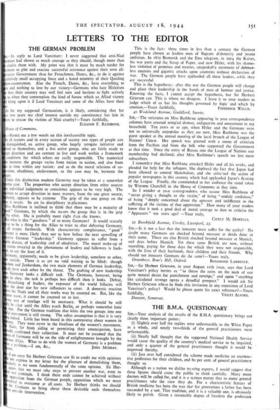— Permit me a few words on this inexhaustible topic.
n all nations and in every section of society two types of people can distinguished, an active group, who largely arrogate initiative and trol to themselves, and a less active group, who are fairly ready to pi direction and are content to live and work within a framework conditions for which others are really responsible. The numerical
o between the groups varies from nation to nation, and also from e to time within any nation.: and so do the moral relations of co- ration, obedience, enslavement, - as the case may be, between the ups.
under this distinction modern Germiny may be taken as a somewhat eme case. The proportion who accept direction from other sources individual judgement or conscience appears to be very high. The ness to accept direction in most matters, from the one great source, hority, appears to be extreme The grip of the one group on the is severe. So are its disciplinary in plications.
liss Rathbone is inclined to think that there may be a majority of " Germans, by which she means the group that is in the grip The other. She is probably more right than she knows.
ut what is this " goodness " of so many Germans? It would scarcely car to be a thing for the Allies to trust to after defeating Germany, all events forthwith. With characteristic complaisance, " good " any is more likely than not to bow before the next upwelling of live German " leadership." Germany appears to suffer from a le disease, of leadership and of obedience. The moral make-up of nation revea!ed in the phenomena of leaders and followers is back- d, to say the least of it.
ermany, apparently, needs to be given leadership, somehow or other, outside. There is as yet no void waiting to be filled: though idom and Junkerdom, the two main elements of German leadership, dy have each other by the throat. The grafting of new leadership Germany looks a difficult task. The -Gerinans, however, being e to obey, the task is perhaps less difficult than it looks. Defeat, discrediting of leaders, the exposure of the world fallacies will w the door ajar for new influences to enter. A domestic reaction st the Nazis and all their works may be counted on. But, like the ar wave, it cannot be counted on to last..
me sort of tutelage will be necessary. What it should be will Y be c'ear until the Allies reach Berlin; or perhaps somewhat later that. For the German tradition that knits the two groups into one ul instrument is still strong. The safest assumption is that it is very g indeed. Little has been heard in this controversy about women in oy. They were never in the forefront of the women's movement. Nazis, far from aiding or permitting their emancipation, have redly confirmed their subjection. It must not be assumed that the en of Germany will be on the side of enlightenment brought by the ors Allies. What to do with the women of Germany is a problem tier.






















 Previous page
Previous page